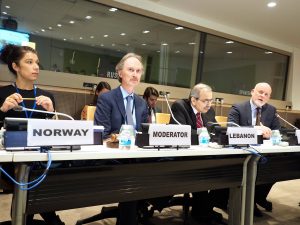As delivered
Address by H.E. Mr Peter Thomson, President of the 71st Session of the General Assembly, at A Roadmap to Achieve the Learning Generation
31 January 2017
 Ambassador Petersen,
Ambassador Petersen,
Ambassador Salam,
Secretary Bokhari,
Distinguished guests,
Ladies and gentlemen,
It’s a pleasure to be here today to join this discussion on the ‘Roadmap to Achieving the Learning Generation’.
I cannot stress enough the central importance of ensuring inclusive, equitable and quality education for all people, of investing in education, and of scaling-up action to achieve Sustainable Development Goal 4 on Quality Education.
Education is a critical enabler of sustainable development. It empowers people with knowledge and once equipped with knowledge, people can indeed transform the world for the better.
When world leaders adopted the 2030 Agenda for Sustainable Development in September 2015, they committed us all to meeting the educational needs of millions of young people around the world.
Despite these commitments, global investments in education have stagnated, with the Education Commission reporting that on current trends, only 1 out of 10 children from low income countries will be on track to gain a basic secondary-level education by 2030. Not surprisingly, those in conflict or disaster-affected countries are most at risk of being left behind.
To reverse this trend globally, dedicated action is needed . This is particularly so for the 75 million children across 35 countries who have had their education disrupted due to conflict, disasters or emergencies.
Today, I would like to highlight three key catalysts for action, which are fundamental to our roadmap for achieving a learning generation.
Firstly, we need to improve coordination and coherence among all stakeholders engaged in the education sector, including Governments, the United Nations, international financing, development and humanitarian agencies, civil society, and the private sector. Such efforts will help to break siloes, avoid duplication, and improve effectiveness and efficiency of education delivery.
Secondly, we need to scale-up investment and ensure adequate, predictable and sustained financing for education. Such efforts will help to bring longer-term perspectives and programming, and improve coordination – particularly in fragile and complex environments.
Thirdly, we need to improve our efforts to sustain peace across our world, thereby creating an enabling environment for education, learning, and sustainable development. In this regard, investing in education should also be seen as a conflict prevention activity, which builds resilience and stability in local populations, reduces their risk to violence and exploitation, and reaps lasting economic and social benefits.
For my part, as President of the General Assembly, I am committed to driving a universal push for progress in the implementation of each of the Sustainable Development Goals, with a particular emphasis on SDG4 as a cornerstone of the 2030 Agenda.
To this end, I have written to all Heads of Government urging them to include the SDGs in the education curricula of every school, so that we may broaden awareness of the logic of 2030 Agenda, and so that all young people learn of the goals as both rights and responsibilities. The young people of today are the adults of tomorrow and I am convinced they will be the most effective agents for the transformation envisaged under the 2030 Agenda.
During the 71st session, I will convene a High-Level Dialogue on achieving the SDGs.
This High-Level Dialogue will bring together key global actors to discuss the importance of raising awareness and understanding of SDG4; to highlight the interconnected nature of the SDGs; and to focus on the importance of quality education for sustainable development.
More details on this event will be shared by my office over the coming months, and I will be encouraging you all to attend.
Excellencies,
Nelson Mandela once said ‘Education is the most powerful weapon which you can use to change the world’. Let us recognise the underlying importance of education to our efforts.
That underlying importance must be fundamental to the international community as we strive to implement the 2030 Agenda and transform our world to one in which extreme poverty is eliminated, prosperity is increased and shared more equitably, the rights of women and girls are secured, climate change is combated, and people live sustainably in peaceful societies.
I wish you all a successful discussion today, and look forward to welcoming you to the High-Level Event on Education in June.
Thank you.

